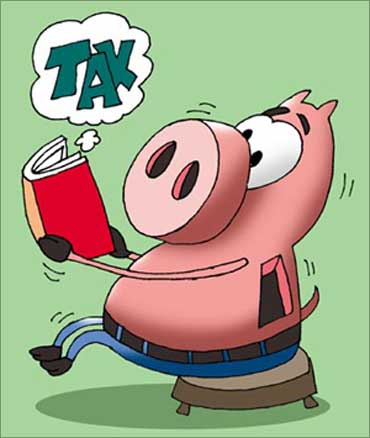
It is earnestly hoped that the Empowered Committee of State Finance Ministers will end the deadlock in its meeting this week.
However, prospects are not very optimistic and surely it will take all the persuasive powers of the chairman of the empowered committee to bring the finance ministers back to the drawing table.
With the reform divided on party lines, the agenda no longer seems to be what is good for the states and the country.
Otherwise, it makes little sense that the parties that championed the cause of tax reforms when they were in power should go back to suggesting the retention of central sales tax in the new reform!
. . .

Thus, while some states are showing no urgency in pushing GST reform, others have even taken a stand which is clearly retrograde and the 'grand bargain' is yet to gain the momentum to bring the reform to the stage of implementation.
It is most unfortunate that the reform process that was progressing so well got stalled. After the Finance Commission's task force report, the states started reopening one can of worms after another.
The recommendation that the states should not be compensated for loss of revenue if they did not implement the 'model GST' did not go down well and the very low estimate of the revenue-neutral rates provoked the states into taking retrograde steps like increasing the VAT rate from 12.5 per cent to 13.5 per cent.
. . .

Given that sales tax is the only major revenue handle to the states and given the wide inter-state variations in the revenue-neutral rates, the states with high effective rates have been suggesting the adoption of floor rates rather than fixed rates.
Furthermore, having been used to taxing the non-residents in the past, some states have gone back on the entire logic of reforms and want to retain their purchase taxes on certain items!
One state has even forgotten the very objective of the reform -- of ensuring a common market in the country -- and is demanding the retention of central sales tax on the queer logic that in any case we cannot implement the ideal form and, therefore, we should accept this aberration.
Surely, the best is the enemy of good, but that should not lead us to choose the worst!
. . .

It must be noted that reviving the GST reform is the only hope for fiscal consolidation for the country in the medium term without retrenching social and physical infrastructure spending.
According to the plan recommended by the Finance Commission, the consolidated fiscal deficit of the central and state governments relative to gross domestic product should be reduced from the budgeted 8.5 per cent in 2010-11 to 5.4 per cent in 2014-15.
In addition to compressing the fiscal deficit by 3 per cent of gross domestic product, the increased spending on food security, education and health care would require a further 3 percentage points in the medium term, which means the central and state governments will have to generate additional resources, disinvest and re-prioritise expenditures to the tune of 6 per cent of GDP.
. . .

It is fervently hoped that the states will see the reason and, in the interest of the accelerating employment and income growth, will look at the larger picture and not squabble and haggle over minor matters.
It takes statesmen to push the reform agenda and there are not many in the states. Perhaps, the Union finance minister should don the mantle and the central government should move forward and implement the reform within the prevailing constitutional parameters.
This requires the Centre to extend the tax to all services by converting the prevailing selective tax into a general tax, unify the excise duty by converging the rates and converting the specific duties into ad valorem and have a common threshold and rate for both goods and services. A separate sumptuary tax can be levied on cigarettes.
. . .

It is fervently hoped that the states will see the reason and, in the interest of the accelerating employment and income growth, will look at the larger picture and not squabble and haggle over minor matters.
It takes statesmen to push the reform agenda and there are not many in the states. Perhaps, the Union finance minister should don the mantle and the central government should move forward and implement the reform within the prevailing constitutional parameters.
This requires the Centre to extend the tax to all services by converting the prevailing selective tax into a general tax, unify the excise duty by converging the rates and converting the specific duties into ad valorem and have a common threshold and rate for both goods and services. A separate sumptuary tax can be levied on cigarettes.
. . .